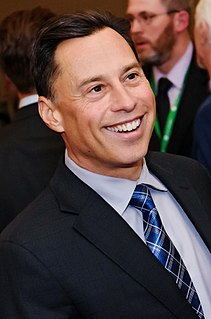Цитата Стефа Макговерна
Лидеры бизнеса регулярно жалуются, что молодые люди не оканчивают школу с нужными навыками. Поощрение молодых людей к предпринимательству устанавливает связь между школой и миром работы, обучая их практическому мышлению, работе в команде, общению и финансовой грамотности.
Связанные цитаты
Существует четкая связь между развитием навыков и талантов молодежи и нашим экономическим успехом как провинции. Такие инициативы, как конкурс Make Your Pitch и ваучер социального воздействия Онтарио, помогают нам воспитывать следующее поколение бизнес-лидеров. Мы продолжим создавать привлекательную среду для нашего следующего поколения предпринимателей, гарантируя, что они разовьют необходимые навыки, необходимые для достижения успеха в глобальной конкурентоспособной экономике и построения будущего Онтарио.
Молодые люди любят и лелеют людей и места, где они получают навыки и эмоциональную поддержку, которые позволяют им добиваться успеха в мире или удовлетворять свои основные человеческие потребности. Одни и те же люди и места часто становятся первыми объектами разочарования и гнева — насилия, вандализма, неуважения — молодых людей, которые не преуспевают в этом мире. Я подозреваю, что это является причиной того, что насилие в отношении личного и школьного имущества растет быстрее, чем кражи со взломом в школах и показатели отсева.
Молодые учителя, скорее всего, работали в чартерных школах, а не просто слышали о них. Чартерные школы часто явно стремятся нанять молодых людей. Я даже разговаривал с людьми, которые не обязательно занимались преподаванием, думая, что хотят работать в чартерной школе, или даже могли считаться критиками движения чартерной школы, и обнаружил, что это был единственный способ добиться своего. нога в дверь. Таким образом, молодые люди просто гораздо лучше знакомы с концепцией.
Мы не инвестируем в финансовую грамотность осмысленно. Мы должны учить младших школьников тому, как балансировать чековую книжку, как вести базовый бухгалтерский учет, почему важно вовремя оплачивать счета. Во-первых, образование. Начинайте процесс обучения как можно раньше, в начальной школе. Во-вторых, поощрять и поддерживать предпринимательство. В-третьих, политика. Я знаю, что приоритетом Министерства финансов США является расширение доступа к финансовым услугам и повышение финансовой грамотности.
В наши дни Господь сделал доступными замечательные ресурсы, которые позволяют вам узнать и полюбить эту работу, вдохновленную Духом Илии. Не случайно, что FamilySearch и другие инструменты появились в то время, когда молодые люди так хорошо знакомы с широкий спектр информационных и коммуникационных технологий. Ваши пальцы обучены писать текстовые сообщения и твиты, чтобы ускорять и продвигать работу Господа, а не только для того, чтобы быстро общаться с друзьями. Навыки и способности, очевидные сегодня у многих молодых людей, являются подготовкой к тому, чтобы внести свой вклад в дело спасения.
Финансовая грамотность — это не самоцель, а пошаговый процесс. Она начинается в детстве и продолжается на протяжении всей жизни человека вплоть до выхода на пенсию. Прививание идеи финансовой грамотности детям особенно важно, потому что они будут нести ее всю оставшуюся жизнь. Результаты опроса очень обнадеживают, и мы хотим внести свой вклад в развитие и укрепление навыков финансовой грамотности всех детей.
Любовь не делает различия между мужчиной и мужчиной, между арийцем и млеччхой, между брахманом и парией, даже между мужчиной и женщиной. Любовь делает всю вселенную своим домом. Истинный прогресс медленный, но верный. Работайте среди тех молодых людей, которые могут посвятить сердце и душу этой единственной обязанности — обязанности поднимать массы Индии. Пробуди их, объедини их и вдохни в них этот дух отречения; это полностью зависит от молодых людей Индии.
Я мотивирую то, что вижу в молодых людях, потому что у нас работает около сорока тысяч молодых людей в наших различных подразделениях Chick-fil-A. Некоторые из них приходят на работу, потому что им нужно работать; другие просто работают, потому что им просто нравится работать. В этом нет ничего плохого.
Сегодня большинство молодых женщин знакомятся с технологиями в очень раннем возрасте, с мобильными телефонами, планшетами, Интернетом или социальными сетями. Они намного лучше разбираются в технологиях, чем предыдущие поколения, поскольку они используют их для всей своей школьной работы, общения и развлечений.
Бизнес требует невероятного уровня стойкости внутри вас, удушающий захват роста вашего бизнеса всегда лидер, это всегда ваша психология и ваши навыки - 80% психология, 20% навыки. Если у вас нет навыков маркетинга, если у вас нет навыков финансовой разведки, если у вас нет навыков рекрутинга, вам будет очень трудно руководить кем-то еще, если у вас нет основных этих навыков. . И поэтому моя жизнь состоит в том, чтобы обучать этим навыкам и помогать людям изменить психологию, чтобы они жили из того, что возможно, а не из своего страха.
Чтобы показать трудности, с которыми сталкиваются дети, лишенные права посещать школу, Camfed сняла серию фильмов об исключении из сферы образования. «Каждый ребенок должен учиться в школе» дает представление о жизни детей, которые из-за бедности были вынуждены бросить школу в очень раннем возрасте и встать на трудный жизненный путь.

































